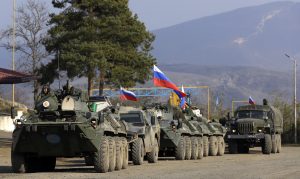Armenia and Azerbaijan each claim a historical and religious connection to the region of Nagorno-Karabakh. The Armenian claim rests on the fact the territory was part of a larger medieval Christian Armenian polity, whose borders far exceeded the boundaries of modern day Armenia. Azerbaijan also claims a historical connection to the land, arguing the territory was frequently invaded and ruled by Muslim Ottoman Turks throughout the late medieval and early modern period. Since the breakup of the Soviet Union, the two countries have fought a number of times over the region, which is largely recognized as part of Azerbaijan but has been occupied by Armenia for decades.
In the most recent conflict between Baku and Yerevan, Turkey’s military and political support was vital and contributed to a number of Azerbaijani military victories. These victories eventually culminated in a Russia-backed peace deal, which returned vast swathes of disputed territory to Baku’s control. However, while many commentators have cited Turkey’s support for Azerbaijan, it is also important to acknowledge the wider support given to Baku by its other major ally, Pakistan.
As soon as the Russian-brokered peace deal came to light, Pakistan issued a statement congratulating the “brotherly people of Azerbaijan on the liberation of their territories.” The press release went one step further, saying Pakistan hoped for a period of “stability and prosperity” and that Azerbaijan’s victory “will pave the way for the return of internally displaced people to their ancestral lands,” a clear statement of support for Azerbaijan’s historic right to Nagorno-Karabakh. Pakistan has repeatedly supported Azerbaijan’s position on the dispute at the United Nations and other international forums. While its support for Azerbaijan is hardly surprising, the diplomatic repercussions for Islamabad may be far-reaching.
Many Armenians believed their former patron, Russia, would provide substantial military support to the Armenian separatist forces in Nagorno-Karabakh, citing the dangerous role Turkey was playing in the conflict. Russia’s decision not to intervene militarily in the conflict, and its refusal to send fighters to the disputed enclave, is the result of a complex web of diplomatic relationships in the region. Among those factors is the recent strengthening of ties between Moscow and Islamabad. Pakistan and Russia have conducted joint military drills and the South Asian nation participated in recent war games hosted by Russia. Pakistan could be an important partner for Russia, particularly given that the two can play an active role in settling regional disputes, including in Afghanistan. The fact that Pakistan’s recent statement acknowledged Russia’s role in ending the fighting is a subtle nod to Moscow’s importance to Pakistan and the wider region.
Russia may also have wanted to avoid upsetting another of its South Asian allies. Whilst playing a delicate balancing act between Azerbaijan and Armenia, Iran still issued frequent statements of support for Baku, with supreme leader Ali Khamenei arguing that “Azerbaijan has the right to liberate its occupied territories.” The diplomatic fallout for Russia from supporting Armenia would have potentially upset its relationship with its firm ally Iran and also threatened to destabilize the recent détente with Pakistan. Perhaps this is one of the reasons President Vladimir Putin decided to remain neutral in the conflict.
It is also important to note Israel’s support for Baku, raising the prospect of a reset between Tel Aviv and Islamabad, particularly given their shared support for Azerbaijan. During the recent conflict over Nagorno-Karabakh, the Israeli-made IAI Harop drone was reportedly deployed to devastating effect against Armenian forces. Israel’s support was solidified after the country’s ambassador to Azerbaijan visited the city of Ganja to offer his condolences to civilian victims of Armenian rocket attacks. Their shared support for Azerbaijan, combined with Israel’s recent peace deals with Arab Muslim states, including the UAE and Bahrain, may potentially bring Pakistan’s Prime Minister Imran Khan closer to establishing formal diplomatic relations with Israel. In fact, just this month, Khan said he was “under pressure” to recognize Israel. The fact that the two sides also support a common ally in the Caucasus could act to bring them closer together.
Peace has been re-established in the Caucasus for now and Pakistan can stand to benefit in many ways, not only by strengthening its relationship with Azerbaijan, but also by using the conflict as a springboard to further the Russia-Pakistan détente, as well as raising the tantalizing prospects of closer relations with Israel. While Nagorno-Karabakh is over 2,000 kilometers from Pakistan’s borders, its conflicts may have a lasting effect on Pakistan’s diplomacy.
Shahid Hussain is a Ph.D. researcher at University College London (UCL) exploring Russia’s diplomatic relationship with Britain in the Early Modern Period.

































